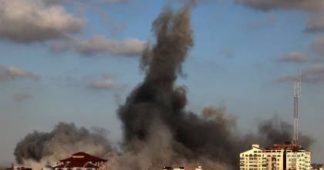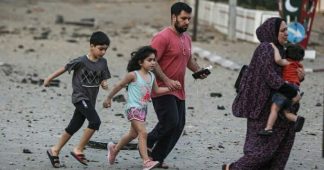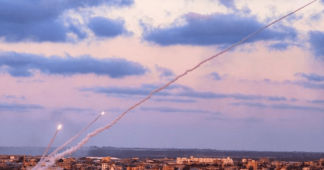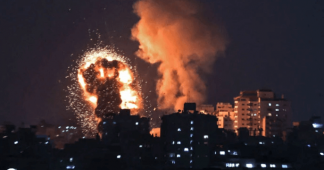Officials from both sides have confirmed the truce, reporting that the ceasefire will begin at 2am, local time
20 May 2021
Israel has accepted Egypt’s proposal for a “mutual” ceasefire in the Gaza Strip, Israeli Prime Minister Benjamin Netanyahu’s office said in a statement on Thursday evening, after several days of mounting international pressure.
A Hamas official told the Reuters news agency that the “mutual and simultaneous” truce would begin at 2 am local time on Friday (11 pm GMT Thursday).
The ceasefire, if it holds, would end the heaviest Israeli bombardment of the Gaza Strip since its 2014 offensive.
With several hours left before it takes effect, Israel’s military said warning sirens were sounding in the country’s south, indicating rockets had been fired from Gaza, while the sound of an air strike could be heard in the besieged Palestinian enclave.
#BREAKING A ceasefire agreement has been reached between #Israel and Hamas in #Gaza, set to begin at 2am Friday morning pic.twitter.com/icm8N8fR3s
— Middle East Eye (@MiddleEastEye) May 20, 2021
The ceasefire comes amid heightened pressure from the US and the European Union.
Earlier on Thursday, the White House said US President Joe Biden had spoken with Egyptian President Abdel Fattah el-Sisi, who helped mediate the upcoming truce.
“The two leaders discussed efforts to achieve a ceasefire that will bring an end to the current hostilities in Israel and Gaza. They agreed that their teams would stay in constant communication toward that end and the two leaders would stay closely in touch,” the White House said at the time.
So far, Israeli air strikes in recent weeks have killed at least 232 Palestinians, including 65 children, while Hamas missiles have been responsible for the deaths of 12 people in Israel.
Despite efforts to broker a ceasefire, both parties continued exchanging blows late on Thursday – with Israeli strikes causing significant damage in the besieged Gaza Strip.
More than two million Palestinians are packed into Gaza, an area the size of the US city of Detroit. Under blockade by Israel since 2006, the area has been described as “the world’s largest open-air prison”.
Earlier, the White House had said that it believed Israel would agree to a ceasefire because it had “achieved significant military objectives that they laid out to achieve, in relation to protecting their people and to responding to the thousands of rocket attacks from Hamas”.
“So that’s why in part that we feel they’re in a position to start winding their operation down,” said White House press secretary Jen Psaki during a regular briefing earlier in the day.
Sheikh Jarrah and al-Aqsa Mosque
Hamas began shooting rockets at Israel on the night between 9 and 10 May. The initial attacks, which caused no deaths or damage, were in response to Israel’s invasion of the al-Aqsa Mosque and its attempts to forcibly evict Palestinian families in East Jerusalem’s Sheikh Jarrah neighbourhood.
Tensions were already high as Israel had put severe limitations on Palestinians’ right to enter and pray at the al-Aqsa Mosque during the holy month of Ramadan. Around the same time, Israel’s Supreme Court had ordered 40 Palestinians in Sheikh Jarrah, including 10 children, out of their homes, which were set to be taken over by Israeli settlers.
Protests erupted in Sheikh Jarrah over the decision, and within days, solidarity demonstrations spread across the rest of occupied East Jerusalem and the West Bank, as well as Gaza.
Israeli forces attacked a large solidarity protest at al-Aqsa Mosque that had followed a massive day of prayers, shooting tear gas and rubber-coated metal bullets into and around the mosque, which is considered the third most holiest site in Islam.
Outrage quickly spread across Palestinian communities, and the Hamas movement gave Israel an ultimatim, demanding it withdraw its forces from the al-Aqsa Mosque and halt its plans to force Palestinian families out of Sheikh Jarrah.
When Israel did not respond, Hamas shot its first missile. The next day, Israel responded with sophisticated air strikes and began taking out high rise buildings. throughout its bombing campaign, a high level of civilian casualties, particularly children, have been documented.
While there were reports that the recently announced ceasefire had been conditional on Israel meeting Hamas’ original demands, Israeli journalist Barak Ravid has reported that no such conditions were agreed upon
BREAKING: Senior Israeli official pushed back on Hamas claims: “The agreement is unconditional. There are no understandings or commitments regarding the al-Aqsa mosque or Sheikh Jarrah as part of the agreement. Those claims are totally false”
— Barak Ravid (@BarakRavid) May 20, 2021
“The agreement is unconditional. There are no understandings or commitments regarding the al-Aqsa mosque or Sheikh Jarrah as part of the agreement. Those claims are totally false,” a senior Israeli official told Ravid.
According to the Israeli military, some 4,000 rockets have been fired into Israel from Gaza since last Monday.
Published at www.middleeasteye.net











